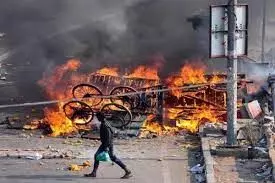
‘Communal riot is a menace’: Delhi court jails 9 convicted in Delhi riot case
text_fieldsNew Delhi: A court in Delhi has sentenced nine persons to seven years of rigorous imprisonment in a case related to the 2020 northeast Delhi riots.
Handing out the verdict the court observed that communal riot is a menace that poses a serious threat to the sense of fraternity among the citizens.
The court also said the acts of the convicts left a deep scar on the social fabric, economy and stability of the country, besides instilling a sense of insecurity among the people and jeopardizing the communal harmony in the society.
Additional Sessions Judge Pulastya Pramachala on Tuesday pronounced the order, sentencing Mohd Shahnawaz, Mohd Shoaib, Shahrukh, Rashid, Azad, Ashraf Ali Parvez, Mohd Faisal and Rashid.
On March 13, the court had convicted the nine accused, saying the charges levelled by the prosecution were proved beyond a reasonable doubt.
"All the convicts shall undergo rigorous imprisonment for a period of seven years for the offence punishable under Section 436 (mischief by fire or explosive substance with intent to destroy house etc.) of the Indian Penal Code and each convict shall pay a fine of ₹ 20,000," the judge said.
The ASJ also said from the recovered fine, ₹ 1.5 lakh would be disbursed to the complainant or victim as compensation and in default of payment of the fine, each convict would undergo simple imprisonment for one year and six months.
"Communal riot is that menace, which poses a serious threat to the sense of fraternity among the citizens of our nation. Communal riots are treated as one of the most violent forms of public disorder that afflicts society and leads to not only loss of life and property but also causes great damage to the social fabric," the judge said.
He said during communal riots, innocent and ordinary people get caught in circumstances beyond their control, which also leads to the violation of human rights in the present case, the convicts indulged in communal riots, which impacted the mindset of people both within and beyond the territorial limits where the act was committed.
"Thus, the impact of the crime committed by the convicts, in this case, is not limited to loss caused to the complainant only. Rather their acts left a deep scar on the social fabric, economy and stability of our nation and the alleged acts instilled a sense of insecurity among the people while jeopardizing the communal harmony in the society," the judge said.
Noting that the defence counsel referred to reformation and sought a lenient approach in sentencing, the judge said the repercussion of crime in the case does not allow invoking the reformatory theory of sentence.
"Moreover, though reformation is the most ideal aim, but even for that purpose there must be some indication appearing from the conduct of the convict and it cannot be demanded just to escape the consequences of misdeeds," the ASJ said.
In the present case, the sentence must be based on the consideration of balancing the impact of crime on the society and background of the convicts, the judge added.
The court also noted that the nine people were held guilty of the charges of forming an unlawful assembly with the object of causing maximum damage to people of a particular community, besides instilling fear and insecurity in their minds, and in pursuance of their common object, the convicts committed vandalism, theft and mischief by fire in the complainant's house in Chaman Park area on the intervening night of February 24 and 25, 2020.
During the proceedings, Special Public Prosecutor D K Bhatia sought maximum punishment, saying a message should go to the masses by giving severe punishment to the convicts.
A charge sheet was filed at Gokulpuri police station against the accused under sections 147 (rioting), 148 (rioting, armed with a deadly weapon) 380 (theft in dwelling house, etc.) 427 (punishment for committing mischief and thereby causing loss or damage to the amount of ₹ 50 or upwards) 149 (every member of unlawful assembly guilty of offence committed in prosecution of common object), 188 (disobedience to order duly promulgated by public servant) and 436 of the IPC.
PTI with superficial edits





